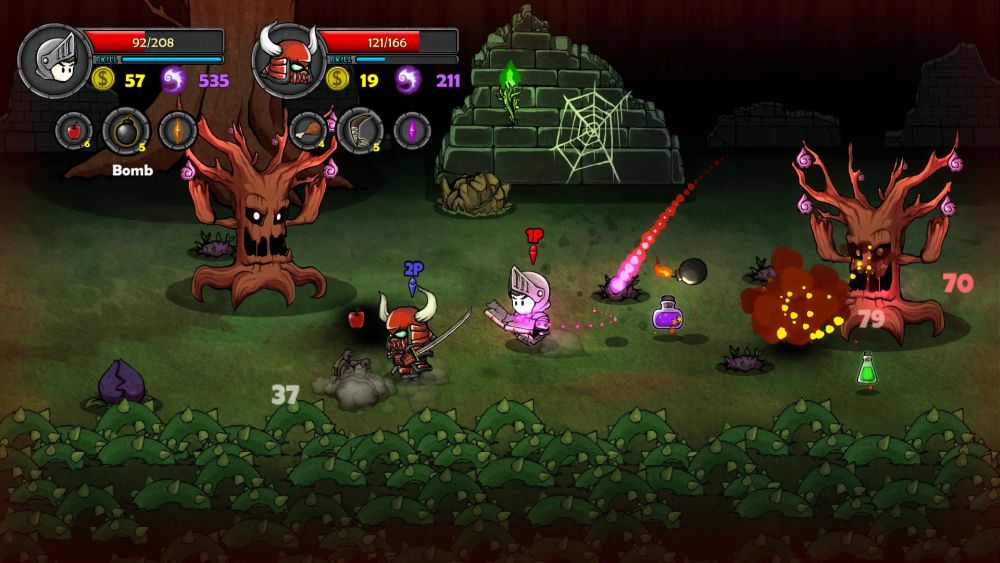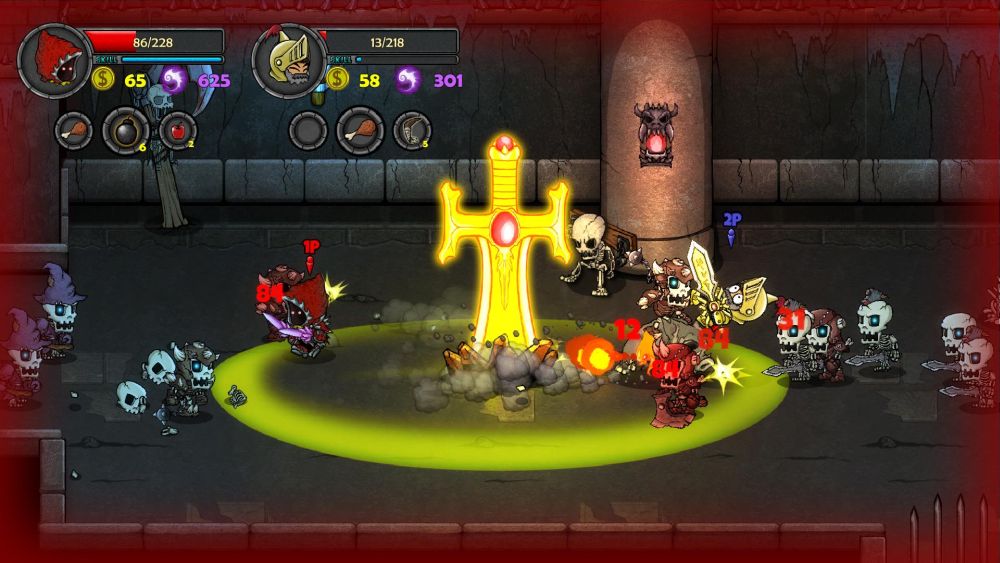

It's time for something that resembles a roguelike! Lost Castle shoves a random character in your hands and turns you loose in a world full of enemies and treasure. No puzzles, no platforming, just a lot of hacking and slashing followed by looting and upgrading. It's a sweet throwback to some classics in the genre, complete with local co-op for two.
So, the Earl accidentally opened a portal to Hell. I know, right? Pretty zany. While he certainly didn't mean to do something so destructive, the reality of the situation is demons are pouring through like water, stuffing the area to the brim with all manner of twisted creatures and associated loot. This is bad news for pretty much everybody. Everybody except adventurers and treasure hunters like you, that is.

Let's get the easy comparison out of the way: Lost Castle will kind of remind you of Castle Crashers, and not just because they both have "castle" in their name. Both games take place on a 2.5D plane where players can move in four directions to dispatch foes. At the end of the level you'll face off against an insane boss, usually something like a giant blob or a goblin on a war machine. You've got a weapon, a special ability, you can jump, and everything looks like a cartoon. The Castle Crashers similarities end there.
Lost Castle bends the rules of combat gaming to combine pseudo-permadeath with pseudo-progression. When you die, your character is gone, and you probably won't control a new one that looks the same (I miss the my afro, that rocked). Your equipment is gone, along with any items you picked up in your journey. But the good news is you start with what amounts to a different class character. Maybe you'll have a big, slow sword, maybe you'll shoot fire instead of swinging a blade. Either way, as soon as you start playing you can find new equipment to get something more to your liking. Changing "classes" doesn't actually affect the gameplay all that much.

What does stick around between deaths are your skills. Upgrades come in the form of a lightly branching tree that splits into attack, defense, and other categories. You pick up purple soul power by defeating certain enemies, and when you die you get to sacrifice that power to upgrade passive abilities, giving you a fighting chance in your ever-continuing quest to kill things for longer periods of time.
Now for some sweet, sweet local co-op. Two players can join up in Lost Castle, choosing between gamepad and keyboard controls. As you might have guessed, gamepad is the way to go. Players share a screen and the camera fights to keep both characters in easy view. Stages aren't very big, so you never really run into visibility or scrolling problems, even if you're trying to mess things up. There's no friendly fire, and if a player dies they can be revived by the other person in a fun micro-game-style interaction.
Looting is always a sore spot in co-op games, as it forces players to choose who gets an item and who has to suffer without. Lost Castle keeps all items persistent, meaning once a player picks something up, the other can't. Most item drops of note take place outside of battle, however, which gives you a moment to negotiate with your pal to see who needs what the most. Health pick-ups are common, throwable items reasonably so, and wearable items are rare. You won't have too tough of a time sorting the sharables, even if your interpersonal skills are lacking.
The Lost Castle experience lasts for five stages, each containing a handful of areas to explore with a boss encounter at the end. Replay value is naturally quite high thanks to a fair amount of randomization along with class change-ups, loot variations, and overall enemy variety. Lost Castle does a great job keeping you busy, and its included co-op mode makes it a great party experience, even if that party only has two people. Downsides are nitpicky in nature, as pretty much everything works just the way it's supposed to. The dialogue is rough in a lot of areas, featuring typos, inconsistencies and awkward word usage.
Lost Castle hits the sweet spot between familiarity and uniqueness. The game can be readily summarized with a couple of genre tags and comparisons to other releases, but when you sit down and play it you quickly realize there's more to it than that. The artwork is creative and catchy, the combat-centric gameplay is fluid without feeling overly complex, and the co-op does exactly what you need it to do: give you and your friends an excuse to beat things up and hoard massive amounts of loot.